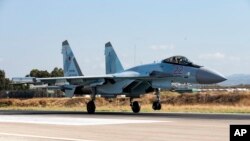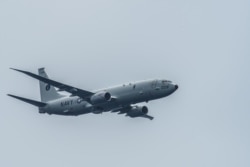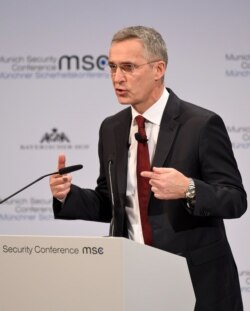A string of hostile actions from Iran, Russia and North Korea have tested U.S. military resolve abroad over the past 48 hours, as the U.S. continues to battle the coronavirus pandemic within its borders.
“We continue to stand guard,” Defense Secretary Mark Esper told NBC in an interview Thursday. “I'm fully confident that we are 100% ready to deal with any threats, any adversaries that are out there.”
The Pentagon released video of what it described as repeated “dangerous and harassing approaches” Wednesday by 11 Iranian Islamic Revolutionary Guard Corps Navy vessels toward six U.S. vessels in international waters in the Persian Gulf. The approach came within 10 meters of the bow of the U.S. Coast Guard Cutter Maui.
In international airspace above the Mediterranean Sea, a Russian Su-35 fighter jet dangerously intercepted a U.S. P-8A Poseidon reconnaissance aircraft, conducting a high-speed, inverted maneuver less than 10 meters directly in front of the mission aircraft. The crew of the P-8A reported wake turbulence following the interaction, which lasted about 40 minutes, according to the U.S. Navy.
U.S. General Tod Wolters, the commander of U.S. European Command and NATO’s Supreme Allied Commander Europe, described the intercept as “unfortunate” and “unprofessional,” adding that Moscow had been made aware of U.S. “dissatisfaction with the event.”
Russia also tested an anti-satellite missile Wednesday, according to the U.S. Space Command.
And a day earlier, North Korea test-fired multiple short-range cruise missiles into the Sea of Japan, according to the South Korean and U.S. militaries, hours ahead of democratic elections in South Korea.
This “extraordinary confluence of developments” by U.S. adversaries and rivals is likely a testing of U.S. military readiness during the coronavirus pandemic, according to Brad Bowman, senior director of the Center on Military and Political Power at the Foundation for Defense of Democracies.
“Undoubtedly, they see a window of opportunity where the United States is really struggling with COVID-19. It has — whether we like it or not, it's an observable fact that it has had an impact on readiness,” Bowman told VOA.
Bowman also pointed to increased Chinese military activity in the South China Sea as the United States’ largest symbols of naval strength, its aircraft carriers, remain unused in the Pacific region.
The USS Theodore Roosevelt is docked in Guam amid a COVID-19 outbreak, the USS Ronald Reagan is undergoing scheduled maintenance in Japan and the crew of the USS Nimitz has been quarantined in Washington state.
Chairman of the Joint Chiefs of Staff General Mark Milley said Tuesday that the Nimitz would set sail “shortly.”
“The bottom line is that security challenges have not diminished because of COVID-19,” NATO Secretary-General Jens Stoltenberg said at a news conference Wednesday. “On the contrary, potential adversaries will look to exploit the situation to further their own interests.
"Terrorist groups could be emboldened. The security situation in Afghanistan and Iraq remains fragile, and we see a continued pace of Russian military activity,” he added.
Esper called this “a normal week” for the U.S. military.
“This is why I said that we must maintain our national mission capabilities, our readiness, our ability to protect the United States, because our adversaries are not standing down,” Esper said Thursday.
As of early Thursday, 4,695 coronavirus cases around the globe were related to the U.S. military — 2,889 service members, 817 civilians, 653 dependents and 336 contractors — the Pentagon said. There have been 19 DOD-related COVID-19 deaths, including two service members.
Jeff Seldin contributed to this report from Washington.







